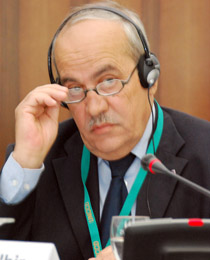- 26 mars 2023
- Envoyé par : gd3a
- Catégorie :

Nadhir Hamada, born March 20, 1948, is a Tunisian politician. former Minister of the Environment and Sustainable Development from 2004 to 2011.
Academic training
A graduate in civil engineering from the Mohammadia School of Engineers in Rabat, Morocco, Nadhir Hamada defended a thesis entitled Biological treatment of urban wastewater by telluric microflora at the University of Lille (France), where he was awarded a doctorate in environmental genius.
Career
He began his career as a teacher in sanitary engineering at the Mohammadia School; He is also an expert consultant for the World Health Organization in the field of hygiene and public sanitation.
He was then appointed Deputy Director of Local Finance and the Environment at the General Directorate of Local Authorities, then Director of Local Authorities within the Tunisian Ministry of the Interior. He simultaneously holds a teaching post at the National School of Engineers of Tunis and at the School of Rural Engineering of Medjez el-Bab.
It contributes greatly to the implementation of the town planning code and law n°76/34 on building permits, the forest code as well as health and hygiene regulations for local communities.
Hamada was promoted in 1994 as CEO of the Office of Housing for Judges and Staff of the Ministry of Justice, a position he held until 1997. It was in 1997 that he was appointed CEO of the company Artificial Cements of Tunisia, a position he held until 1999, when he became CEO of the Compagnie des transports par pipelines au Sahara (TRAPSA). After four years at the head of this company, he was appointed Secretary of State to the Minister for Agriculture, the Environment and Hydraulic Resources, in charge of the Environment, on June 16, 20031. In 2004, he was promoted to Minister of Environment and Sustainable Development, a position he held until the 2011 revolution.
International activities
It participates in the action plan on the Mediterranean set up by Yale University (United States). Assigned to the Arab Organization for Education, Culture and Science in 1986, he carried out a study on the assessment of the state of the environment in the Arab world.
He became president of the group of councils of Arab ministers of the environment between 2006 and 2008 and president of the group of African countries at the United Nations Environment Program in 2007. He also holds the position of president of the Sahara Observatory. and the Sahel from 2003 to 2010.
